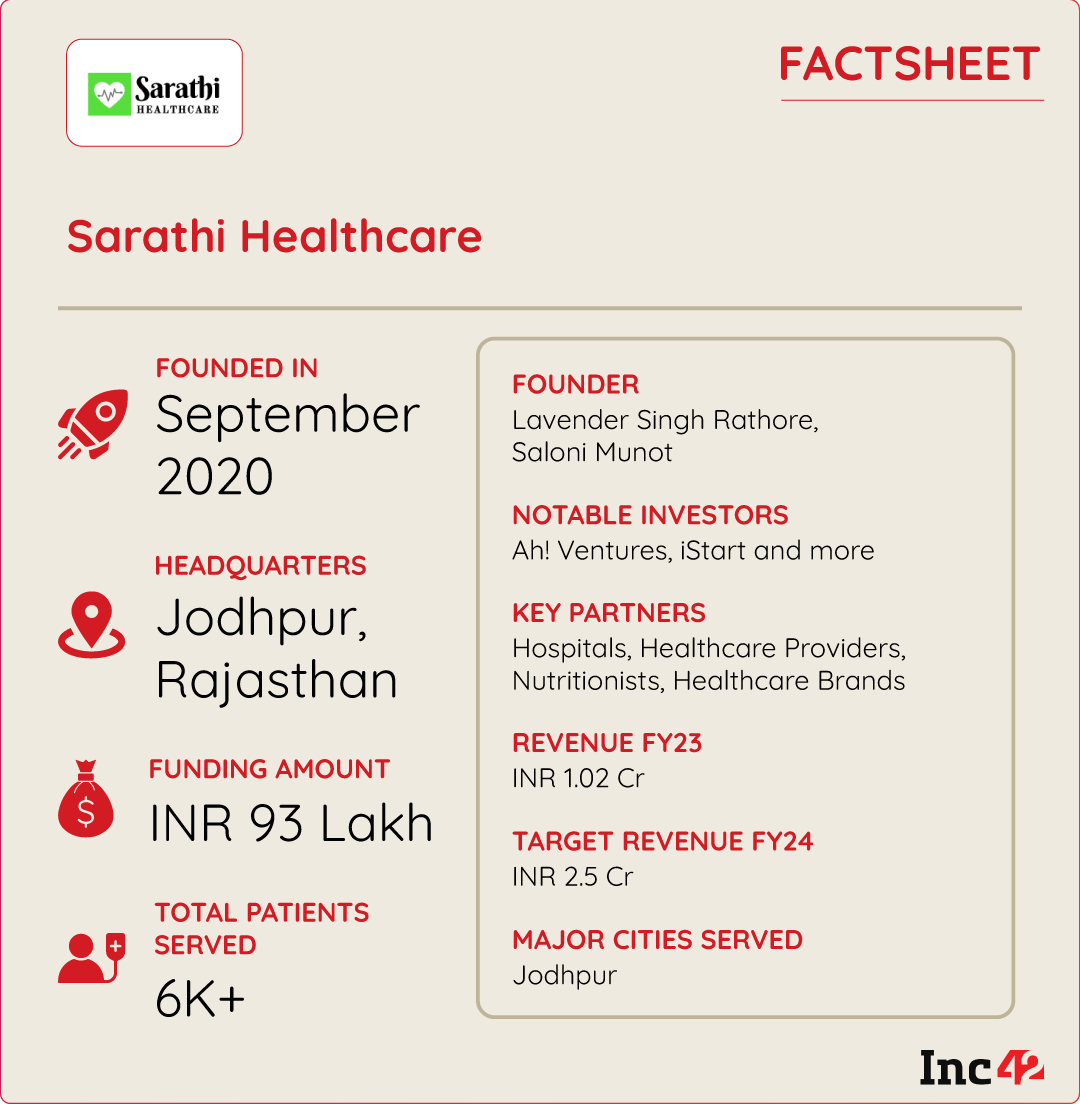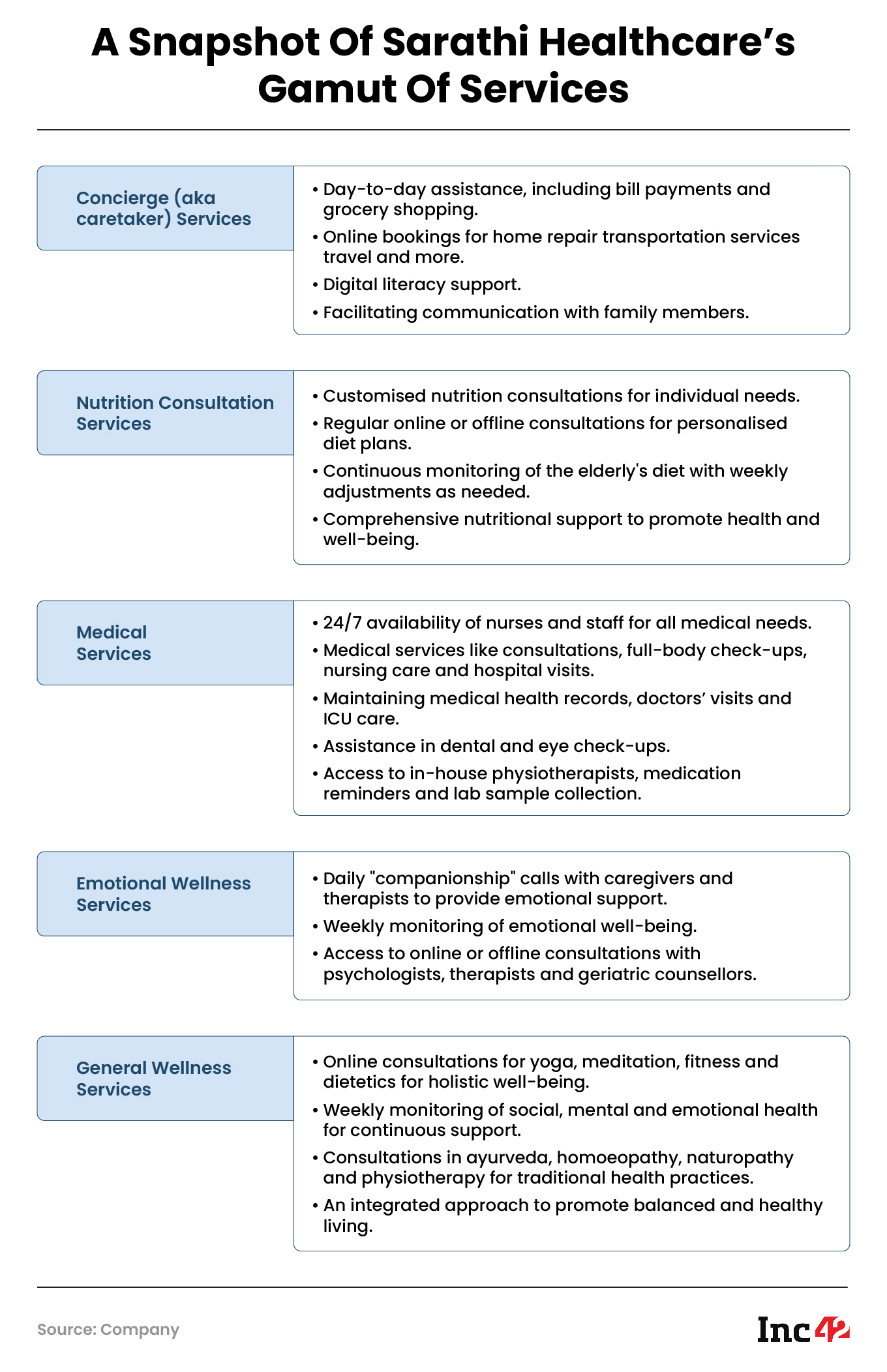Startup Stories
How Sarathi Healthcare’s Holistic Care Approach Is Elevating The Lives of Senior Citizens In Rajasthan

The Jodhpur-based healthtech startup, Sarathi Healthcare, provides the elderly access to medical services like health monitoring, homecare assistance, doctor consultations and other medical facilities
The startup clocked INR 1.02 Cr revenue in FY23 and has raised INR 93 Lakh since its inception. Sarathi Healthcare aims to generate INR 2.5 Cr in FY24 revenue
Sarathi Healthcare competes with names like 60Plus India, Alserv, ElderAid and GetSetUp in the country’s geriatric care market, which is expected to become a market opportunity of more than $41 Bn by 2028
Who isn’t familiar with the horrors that the Covid-19 pandemic brought upon humanity? While the initial days were fun to stay inside the confines of the homes, everything started getting out of hand after that.
And while the 21-day nationwide lockdown hardly did the trick to contain the spread of the deadly variant of the coronavirus family, it certainly led to behavioural and mental health issues among the population, with the elderly being hit the most.
According to a study by the Agewell Foundation, the elderly went through high degrees of Covid-19-related anxiety, insomnia, panic attacks, depression and chronic stress.
“The pandemic took a heavy toll on the elderly due to their weak immunity. To make matters worse, many fell prey to depression due to loneliness at the time when social distancing was the new norm,” said Lavender Singh Rathore, the founder and CEO of healthtech startup Sarathi Healthcare, which provides holistic care to the elderly.
According to Rathore, the situation was all the more gruesome for the elderly, whose children or other family members were away and couldn’t travel as transportation services across the country came to a screeching halt. And then there was a flow of negative news from all possible means — TV channels, WhatsApp groups and social media platforms.
“My friends living away from their parents in different cities constantly asked me to keep a check on their parents and it was painful for me to see them in a constant state of fear,” Rathore said, adding that it proved to be the tipping point that triggered him to do something for the old.
It was then that Rathore joined forces with Sushil Sharma, CEO and founder of Marwari Catalysts to launch Sarathi Healthcare in September 2020 to give the elderly the care they needed, both physical and mental, as the virus wreaked havoc. Rathore raised INR 5 Lakh seed funding from Marwari Catalysts, paving the way for the startup’s launch.
Later, in September 2023, dentist Saloni Munot joined Rathore’s startup as the cofounder and COO, while Rathore assumed the role of CEO and cofounder. Meanwhile, Sharma is the director of Sarathi Healthcare.
The Jodhpur-based healthtech startup provides the elderly access to medical services like health monitoring, homecare assistance, doctor consultations and other medical facilities (more on this later). Besides physical health services, the startup provides nutritionists, ‘concierge’ services (caretakers), wellness and health counsellors.
All these services and facilities can be accessed by the elderly (and their caregivers) 24/7 via the company’s website. The startup is also working on its app, HealthSarathi, which will be ready by March 2024.
Meanwhile, the users can leverage the Sarathi website to book blood tests and body checkups and order health supplements. For this, the startup has a network of 12 hospitals, 38 super speciality doctors, 13 healthcare providers (concierge), 3 nutritionists, 3 counsellors and 12 healthcare brands.
Further, the services of the startup, which predominantly operates in Jodhpur, have already been used by over 6K individuals across Rajasthan. The startup also has the state government’s support under the iStart initiative.
According to Rathore, iStart has been one of the earliest supporters in their journey. Under the state’s initiative, not only did the startup receive financial aid when it was in its nascency but also expert assistance in understanding the legalities of starting a company.
The iStart programme of the state government proved to be a shot in the arm for the healthtech startup, which then soon lapped up investments from Ah! Ventures and a clutch of high-networth individuals based in Jodhpur, Nashik and Pune. To date, Sarathi Healthcare has raised INR 93 Lakh in Seed funding.
Pertinent to mention that the startup clocked INR 1.02 Cr revenue in FY23 and is now looking at a 145% YoY increase in the metric.
Meanwhile, without divulging many details, Rathore hinted that the startup was working on building a proprietary tech stack that would help bridge the communication gap between senior citizens and their families.

From Catering To Legacy Pharmas To Creating A Social Impact
Before embarking on his entrepreneurial journey, Rathore served the pharma sector for three decades, working with legacy players like Zydus Cadila, USV and Boehringer Mannheim.
It was not until the pandemic that the gaps in the country’s healthcare system started making sense, inspiring him to set up Sarathi Healthcare.
Upon the startup’s launch, the founders encountered their first major challenge, which was navigating the complex legal and regulatory requirements associated with establishing a private limited company. Understanding legal compliance proved to be a daunting task. However, Rathore said he was fortunate that the Rajasthan government intervened to simplify the processes for Sarathi Healthcare.
Now, the next challenge was to optimise the company’s operational systems. This obstacle was addressed by assembling a team of experts, addressing core issues and systematically tailoring solutions.
Rathore said that this combination of experience, dedication and strategic problem-solving boosted Sarathi Healthcare forward, enabling it to have a meaningful impact in the healthcare sector.
The results of their efforts became evident when the startup onboarded the first 100 patients within three months of its launch and 800 users in the first five months.
How Sarathi Healthcare Became A True Companion For The Elderly
Rathore told Inc42 that Sarathi Healthcare was founded based on the core belief that elderly care goes beyond just medical needs. Therefore, the Sarathi Healthcare team has been focussed on providing holistic care, encompassing all aspects of human well-being.
“Emotional well-being is just as crucial as physical health. If ignored, this could manifest in physical ailments,” the founder said, adding that Sarathi Healthcare harnesses the power of technology to provide round-the-clock healthcare services to the elderly.
While the startup understands the importance of wellness and emotional and medical care, it has not overlooked the social needs of the elderly. To further inculcate a sense of belonging, the startup has created a WhatsApp group for those who have signed up on the website to foster peer-to-peer interaction. The group also has doctors who share medical advice with the group.
Moving on, Rathore and his team also acknowledge the fact that a lot of senior citizens may not be tech-savvy, and this is why Sarathi Healthcare provides 24/7 customer service to its users via a number on its site.
Meanwhile, here’s a brief snapshot of the startup’s array of services for the elderly.

In addition to these services, users can order essential supplements, basic medical gadgets and first aid supplies.
While talking about the startup’s plans, Rathore said that users can subscribe to all their services for INR 3K for three months, INR 5.4K for six months and INR 9.9K for a year.
According to the founder, 15% of the startup’s revenue is generated from caretaking services, 10% from nutrition consultancy and physiotherapy services, 15% from well-being and emotional counselling, lab and radiology services, and the remaining 60% from retail.
What’s On The Horizon?
As of now, the founders of Sarathi Healthcare have set their eyes on setting their footprint in Tier II and III cities of the country, with better healthcare facilities for the elderly.
To fuel its expansion plans, Rathore said, the startup is actively engaging with potential investors and VC platforms like GSK, Hello Tomorrow, PadUp Ventures, Build3 Accelerator and Goa Angels.
Recognising that the startup cannot replace the role of actual family and children in the lives of the elderly, Rathore said that his team is laser-focussed on providing professional care tailored to meet the needs of senior citizens.
The need to address substantial gaps in elderly care, particularly in underserved areas and Tier II and III cities, cannot be undermined. This is because the country’s elderly population today accounts for more than 35% and the need to give them access to high-quality healthcare, both mental and physical, is greater than ever.
Fortunately, a growing number of startups like Sarathi are committed to tackling this issue with an iron hand. For instance, Sarathi Healthcare competes with names like 60Plus India, Alserv, ElderAid, and GetSetUp in the country’s geriatric care market, which is expected to become a market opportunity of more than $41 Bn by 2028.
Startup Stories
Byju’s partially pays March salaries, pending February payouts.

Byju’s, a prominent player in the edtech industry, has encountered financial challenges resulting in delayed salary payments for its employees. As of April 20, the company has only disbursed a portion of March salaries, attributing the delay to a severe cash crunch. Despite earlier assurances from the company’s management that salaries for March would be paid by April 18, many mid-senior employees have reported receiving only 50% of their March salaries. Additionally, February salaries remain unpaid for a significant number of employees, further exacerbating the situation.
Founder and CEO, Byju Raveendran, has resorted to raising personal debt against his stakes in the company to facilitate salary payments. This underscores the severity of the financial challenges facing Byju’s and highlights the lengths to which Raveendran is willing to go to address the issue.
Employee testimonies reveal the extent of the salary delays, with one employee stating that they received only 50% of their March salary on April 20, with 80% of their February salary still pending. Another concerning aspect is the reported disparity between junior and senior employees, with junior staff receiving full salary payments while top management has gone without salaries for the past two months.
Byju’s has acknowledged the delay in salary payments but has not provided a detailed explanation for the situation. A company spokesperson declined to comment on queries from ET regarding the matter. In an email sent to employees on April 8, the management team expressed regret over the delay and attributed it to the inability to secure approval to access funds from a rights issue. The delay has been further compounded by actions from foreign investors, hindering the company’s access to necessary funds.
This revelation follows a previous report by ET on April 1, which highlighted Byju’s decision to delay salary payments due to constraints imposed by warring investors, limiting the company’s access to funds through a rights issue. The ongoing dispute with investors, including Dutch investor Prosus, has added to Byju’s financial woes and has led to further delays in resolving the issue.
In a separate development, Byju’s India chief executive, Arjun Mohan, announced his departure from the company in mid-April, just six months after assuming the role. This unexpected move prompted founder Byju Raveendran to take on the responsibility of overseeing day-to-day operations of the company’s India business, housed under Think & Learn, marking a significant shift in leadership.
Amidst these challenges, Byju’s is embroiled in a legal battle with a group of investors led by Prosus, who are seeking to block a rights issue and the removal of Byju Raveendran as CEO. The company has also initiated arbitration proceedings to address the dispute and find a resolution.
The rights issue undertaken by Byju’s is significant, as it is being offered at a staggering 99% discount to the company’s peak valuation of $22 billion. This steep discount has implications for investors who choose not to participate in the funding, potentially resulting in a significant dilution of their shareholding post-completion of the rights issue.
The unfolding events at Byju’s underscore the challenges facing the edtech giant as it navigates financial constraints, leadership transitions, and legal disputes. The company’s ability to address these issues effectively will determine its future trajectory and its ability to maintain its position in the competitive edtech landscape.
Startup Stories
Revolut India receives provisional approval for PPI license from RBI

Revolut India, a neobank backed by Tiger Global and Softbank, has secured an in-principle approval from the Reserve Bank of India (RBI) for issuing Prepaid Payment Instruments (PPI), encompassing prepaid cards and wallets. CEO Paroma Chatterjee shared this development in a LinkedIn post on Friday. This approval complements Revolut India’s existing licenses from the RBI, which allow it to function as a Category-II Authorised Money Exchange Dealer (AD II), enabling the issuance of multi-currency forex cards and cross-border remittance services.
Chatterjee emphasized the significance of this milestone, highlighting the opportunity it presents to provide Indian consumers with both international and domestic payment solutions on a unified platform. Revolut, Europe’s largest neobank, entered the Indian market in 2021 with aspirations to disrupt the domestic payments sector. The RBI’s approval is expected to bolster Revolut’s position as a key player in this domain.
Prepaid Payment Instruments (PPIs) are payment tools that utilize stored monetary value, including digital wallets, smart cards, or vouchers, for transactions. RBI Governor Shaktikanta Das proposed on April 5, 2024, to allow PPIs to be linked through third-party UPI applications, enabling PPI holders to conduct UPI payments akin to bank account holders.
Chatterjee underscored Revolut’s commitment to full compliance with regulatory requirements, particularly in India, where the neobank has undertaken significant efforts to localize its global tech-stack to adhere to local regulations.
In an interview with ET BFSI, Chatterjee disclosed Revolut’s plans to introduce a comprehensive suite of digital-first money management services for all Indian customers. These services will enable users to manage their finances, including payments and remittances, both domestically and internationally.
The app, currently in use by employees, will be officially launched once the internal testing phase is completed, according to Chatterjee. She also revealed that there are over 175,000 prospective customers on Revolut India’s waitlist, indicating strong interest in the product.
Startup Stories
Postman buys Orbit to extend developer community reach.

Postman, renowned as an API management platform tailored for enterprises, has recently made headlines with its acquisition of Orbit, a pivotal tool in the arsenal of developer companies for nurturing communities across a spectrum of platforms, including Discord, Slack, and GitHub. Although the specifics of the financial transaction remain undisclosed, Postman took to its blog to underline Orbit’s indispensable role in supporting major developer companies in fostering community management and fostering growth over the course of the past four years.
Within the ecosystem of Postman, the integration of Orbit is poised to be transformative, with the Orbit team set to assume a pivotal role in seamlessly embedding community-centric features into the fabric of the Postman Public API Network. This strategic move is aimed at catalyzing dynamic collaboration between content creators and end-users within the network. Postman, boasting a staggering valuation of $5.6 billion, stands as a stalwart in the realm of API collaboration platforms, serving a user base exceeding 30 million developers and 500,000 organizations.
Under the stewardship of Noah Schwartz, a recent addition to the Postman team hailing from Amazon Web Services, the Orbit team is primed to spearhead initiatives aimed at empowering API distributors to broaden the horizons of their communities, optimize API utilization, and solicit direct feedback from users entrenched within the network.
This integration is anticipated to embolden developers to unearth APIs tailored to their unique requirements and foster meaningful engagements with peers to extract maximum value from each API. However, as part of the transitionary phase, Orbit has outlined plans to gradually phase out its existing product and platform over the span of the next 90 days. Commencing July 11, all functionalities will be deactivated, with no provision for the creation of new users or workspaces.
Postman’s strategic maneuver comes on the heels of its triumphant fundraising endeavor in 2021, securing a whopping $225 million in funding. The fundraising round, spearheaded by Insight Partners, witnessed active participation from prominent entities such as Coatue, Bond Capital (helmed by Mary Meeker), and Battery Ventures.
-

 Startup Stories1 year ago
Startup Stories1 year agoWhy Millennials, GenZs Are Riding The Investment Tech Wave In India
-

 Startup Stories1 year ago
Startup Stories1 year agoStartups That Caught Our Eyes In September 2023
-

 Startup Stories1 year ago
Startup Stories1 year agoHow Raaho Is Using Tech To Transform India’s Fragmented Commercial Trucking
-

 Startup Stories1 year ago
Startup Stories1 year agoMeet The 10 Indian Startup Gems In The Indian Jewellery Industry’s Crown
-

 Crptocurrency10 months ago
Crptocurrency10 months agoLither is Making Crypto Safe, Fun, and Profitable for Everyone!
-

 Startup Stories1 year ago
Startup Stories1 year agoWOW Skin Science’s Blueprint For Breaking Through In The $783 Bn BPC Segment
-

 Startup Stories1 year ago
Startup Stories1 year agoHow Volt Money Is Unlocking The Value Of Mutual Funds With Secured Lending
-

 E-commerce1 year ago
E-commerce1 year agoTop Online Couponing Trends To Watch Out For In 2016




